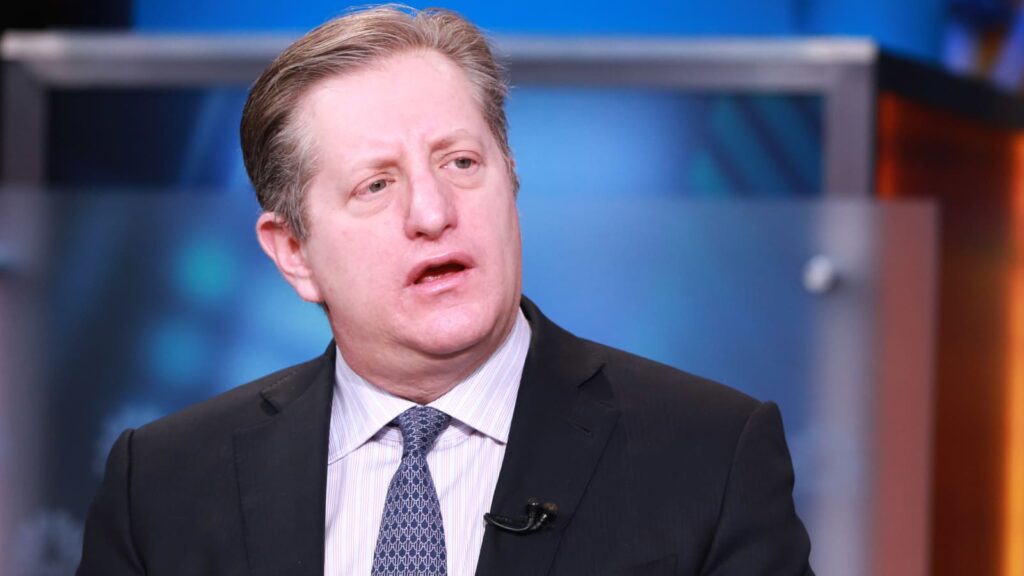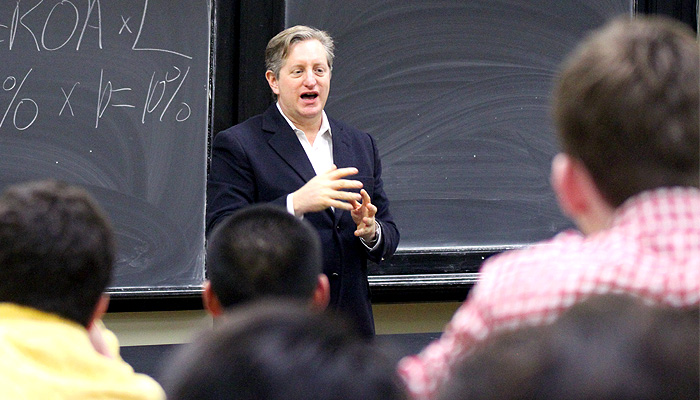Eisman’s rise in the financial sector is a testament to his strategic acumen and relentless drive. At FrontPoint Partners, he made headlines by betting against collateralized debt obligations (CDOs), a move that would later become a cornerstone of his legacy.
Steven Eisman, born July 8, 1962, is a prominent investor known for his role in the 2008 financial crisis. His career at FrontPoint Partners, where he shorted CDOs, and his subsequent ventures, including founding Emrys Partners, showcase his financial expertise.
From predicting the financial meltdown to confronting the dark side of education, Steven Eisman’s journey is a riveting tale of risk, resilience, and revolution.
What made Steven Eisman famous?
Steven Eisman gained fame for his bold bet against collateralized debt obligations (CDOs) during the 2008 financial crisis. At FrontPoint Partners, his foresight and strategic short positions on these financial products were pivotal.
This move was famously chronicled in Michael Lewis’s book The Big Short, and the film adaptation brought his story to a global audience.
Eisman’s ability to foresee the housing market collapse and profit from it showcased his exceptional analytical skills and understanding of market dynamics. His investment strategy, which initially seemed risky, proved to be a prescient move that made headlines worldwide.
His story, including his transformation into the character Mark Baum in The Big Short, cemented his place as a key figure in financial history. Eisman’s journey from a finance professional to a cultural icon reflects both his expertise and his dramatic impact on the industry.
How did Steven Eisman’s career evolve after FrontPoint Partners?
After leaving FrontPoint Partners in 2011, Steven Eisman ventured into new financial territories by founding Emrys Partners. Although the fund faced performance challenges and was ultimately shut down in 2014, it marked a significant chapter in his career. The decision to close Emrys was driven by shifting investment philosophies and market conditions.

Following the closure of Emrys Partners, Eisman joined Neuberger Berman in 2014 as a managing director. Here, he continued to apply his investment expertise, focusing on managing portfolios and providing financial insights. This role allowed him to leverage his experience and maintain his influence in the financial world.
Despite the ups and downs, Eisman’s career trajectory highlights his adaptability and commitment to the industry. His ability to navigate through market shifts and regulatory changes underscores his resilience and enduring impact.
Read: Connie Kline – A Life of Dedication and Influence!
What is Steven Eisman’s educational background?
Steven Eisman’s educational journey began in New York City, where he attended Yeshiva schools. He then went on to achieve high academic honors at the University of Pennsylvania, graduating magna cum laude in 1984. This strong foundation in education set the stage for his future success in finance.
Eisman furthered his education at Harvard Law School, where he earned an honors degree in law. Although he initially pursued a legal career, his transition to finance was marked by his analytical prowess and market insight, which proved invaluable.
His educational achievements reflect a blend of rigorous academic training and practical experience. This background equipped Eisman with the tools necessary to excel in the complex world of finance and investment.
What personal challenges has Steven Eisman faced?
Loss of His Son:
Steven Eisman experienced the tragic loss of his son, Max, who died due to an accident involving his night nurse. This profound personal tragedy has deeply affected him and influenced his outlook on life.
Career Transitions:
Eisman faced significant challenges when transitioning from a career in law to finance. Initially unhappy with his legal career, he had to navigate the complexities of switching fields and proving his expertise in a new domain.
Emrys Partners’ Underperformance:
His investment fund, Emrys Partners, faced notable underperformance and was eventually shut down in 2014. The difficulties in achieving desired returns and adapting to market conditions were significant setbacks.
Criticism and Controversy:
Eisman faced criticism for his outspoken views on the for-profit education industry. He was accused by some of profiting from his criticisms and attempting to influence regulatory changes for personal gain.
Impact of Public Scrutiny:
The public and media scrutiny resulting from his role in *The Big Short* and his subsequent criticisms of various industries placed him under a high level of public and professional scrutiny, affecting his personal and professional life.
How has Steven Eisman influenced financial regulations?
Steven Eisman’s critical stance on the for-profit education industry has had a significant impact on financial regulations. His analysis of the sector’s practices, which he likened to the subprime mortgage crisis, led to increased scrutiny and regulatory changes.

Eisman’s advocacy highlighted the predatory nature of some for-profit educational institutions, drawing attention to their impact on students and the broader financial system. His efforts contributed to the implementation of stricter consumer protection measures.
By influencing regulatory frameworks, Eisman’s work has helped address systemic issues within the education sector. His actions have contributed to greater transparency and fairness in how educational institutions operate.
Read: Unsuccessful.Draft Pick – Find Out How To Make Better Choices!
What role did Steven Eisman play in The Big Short?
Steven Eisman was portrayed as Mark Baum in Michael Lewis’s book *The Big Short* and its film adaptation. The book and movie depicted his role in betting against CDOs and his critical analysis of the financial market’s vulnerabilities.
The character of Mark Baum, played by Steve Carell in the film, showcased Eisman’s investment strategies and his foresight regarding the housing market collapse. This portrayal brought Eisman’s story to a broader audience and highlighted his significant contributions to understanding the financial crisis.
Eisman’s depiction in The Big Short has cemented his place in popular culture, illustrating his impact on both the finance industry and public awareness of financial practices. His real-life story is intertwined with the dramatic narrative of the film.
What is Steven Eisman’s current professional focus?
As of 2024, Steven Eisman is a senior portfolio manager at Neuberger Berman. In this role, he manages investment portfolios and continues to apply his extensive financial expertise. His position allows him to influence investment strategies and market decisions.
Eisman’s current role involves overseeing significant assets and providing insights into financial markets. His experience and strategic approach contribute to the success of Neuberger Berman’s investment operations.
His ongoing work reflects his commitment to the finance industry and his ability to adapt to evolving market conditions. Eisman’s current focus demonstrates his enduring influence and expertise in managing investments.
How did Steven Eisman’s family background influence his career?
Steven Eisman’s family background in finance played a crucial role in shaping his career. His parents, who were brokers at Oppenheimer, provided him with an early exposure to the financial industry. This environment fostered his interest and skills in finance.

Eisman’s transition from law to finance was facilitated by his family’s connections and support. Their influence helped him secure a position at Oppenheimer, where he began his career in equity analysis.
The financial acumen and industry insights he gained from his family background contributed to his success as an investor. Eisman’s career trajectory reflects the impact of his upbringing and the opportunities it provided in the world of finance.
Read: Nftrandomize – Start Crafting Unique NFTs!
FAQs:
1. What educational background does Steven Eisman have?
Steven Eisman has a distinguished educational background. He graduated magna cum laude from the University of Pennsylvania in 1984 and earned an honors degree from Harvard Law School. His academic achievements provided a strong foundation for his subsequent career in finance.
2. How did Steven Eisman’s early career shape his future?
Eisman’s early career at Oppenheimer & Co. as an equity analyst played a crucial role in shaping his future. Although he initially pursued a legal career, his shift to finance, supported by his family connections, allowed him to develop the skills and insights that would lead to his success in predicting the 2008 financial crisis.
3. What impact did The Big Short have on Steven Eisman’s career?
The Big Short, both the book and the film adaptation, significantly impacted Steven Eisman’s career. It brought his investment strategies and role in the financial crisis to international attention, enhancing his public profile and solidifying his reputation as a key financial thinker.
4. What led to the closure of Emrys Partners?
The closure of Emrys Partners in 2014 was due to several factors, including poor performance and a shift in investment philosophy. Despite efforts to turn the fund around, Eisman decided to shut it down, citing challenges in maintaining profitability and adapting to changing market conditions.
5. What are some of Steven Eisman’s notable achievements?
Among Steven Eisman’s notable achievements are his successful prediction of the financial crisis and his influential critique of the for-profit education sector. His ability to identify and capitalize on market inefficiencies has earned him recognition as a prominent figure in finance.
6. How did Steven Eisman’s personal life influence his professional decisions?
Steven Eisman’s personal experiences, particularly the loss of his son Max, have influenced his professional decisions and outlook. This profound loss has added a layer of depth to his perspective on risk and investment, shaping his approach to both personal and professional challenges.
7. What criticisms has Steven Eisman faced?
Steven Eisman has faced criticism for his controversial stance on the for-profit education industry. Some have accused him of profiting from his critical views and influencing regulatory changes for personal gain. However, his work has also been credited with prompting important reforms and consumer protections.
8. What are Steven Eisman’s future plans?
While specific future plans are not always publicized, Steven Eisman is expected to continue his role at Neuberger Berman and maintain his influence in the financial sector. His ongoing work in portfolio management and investment strategies suggests that he will remain a significant figure in finance.
Conclusion:
As Steven Eisman continues his work at Neuberger Berman and remains a key voice in finance, his legacy serves as both an inspiration and a reminder of the importance of vigilance and insight in investment and regulation.
Read more:



